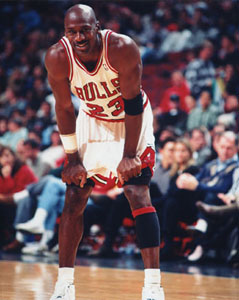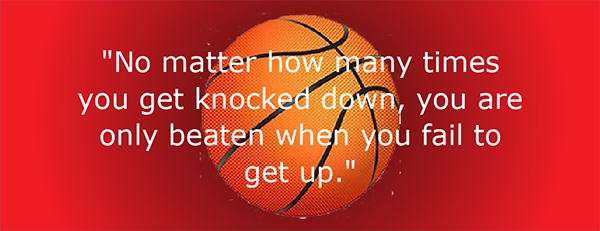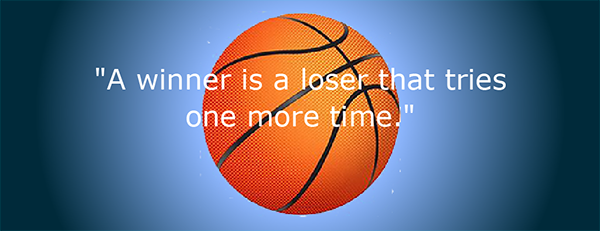- Offensive Techniques & Strategies
Playing Through Adversity
What to Discover or Recall:
Discover that when faced with a difficult task or adversity, players digress through three levels of human behavior: Effort, Loss of Control and Quitting.
Understand that great players view adversity as a challenge and are determined to over come it.
Learn that great players very rarely ever lose control and become frustrated or hostile.
Comprehend that once a player starts to loose control, they are no longer an asset to the team.

A lesson to learn not only on the court, but in life as well.
Coaches expect their players to play with determination and effort, to play hard, and to play through adversity, but very few coaches give them the means or the tools that will allow them to accomplish these great expectations. By knowing and understanding the various phases of human behavior, and how they affect performance, will enable players not only to play through adversity, but also to be more successful and productive in the process.
When faced with a difficult task or adversity, players will digress through the following three phases or levels of human behavior:
Phase I: Effort and Determination
When faced with adversity, players will first try hard in an attempt to overcome it. However, if/when they are not successful, players will progress into the second phase of behavior and start to loose self-control.

Players must learn that success is achieved through hard work and determination. That successful players work harder for longer periods of time than mediocre ones, and very rarely will ever loose self-control during a game. Great players, such as Michael Jordan, actually view adversity and pressure situations as a challenge, not as an obstruction or detriment, and are highly self-motivated to overcome it.
Can you imagine, every time you step on the court that you had to face the opponent's meanest, toughest defender. That you are going to be double and tripled teamed. Held, pushed and grabbed. This is what Michael Jordan faced in his entire career. However, despite all of this, did you ever see him loose control or even throw a punch in retaliation? Never, because he view it as a personal challenge and was motivated to overcome it.
Phase II: Loss of Control
In the second level of human behavior, players will become frustrated and aggressive. They become verbally and physically abusive, and look for excuses or scapegoats. They can even sometimes get violent and hostile. This frustration and loss of self-control requires a great expenditure of physical, emotional, and spiritual energy; and, as a result, only lasts for a short period of time.
Once a player starts to loose control, they are no longer an asset to the team, and the coach must immediately remove them from the game and reminded them to play through adversity. That they will have some bad moments, but never a bad game.
Because of their determination, work ethic and their ability to control their emotions in the face of adversity, great players very rarely advance to this second phase of human behavior.
Phase III: Quitting
Since players are physically, mentally and spiritually beaten, they will advance quickly into the third phase of behavior and quit. The situation is not worth any more effort. They give up entirely and throw in the towel.


Best Effort
"Winning is the only thing!" This may be true on the Professional level, however, on all other levels of the game of basketball giving your best effort is of the utmost importance. Playing through adversity is one of the most important lessons players can learn from this great game.
Therefore, it is of the utmost important that players learn to play through adversity, and not to worry about the things they cannot control. They should be taught to never allow a bad call or a bad play affect their performance and concentration. When they give it their best effort, they may run out of time during a game, but they will be the winners, regardless of the score.
Failure
Failure is actually progress. It is label Failure, but is a very important part of the learning process. If something does not work, simply analyze why and try again. Knowing what not to do is just as important as knowing what to do. Success takes hours, days and even years to achieve.

© 2026 HoopTactics All Rights Reserved.
